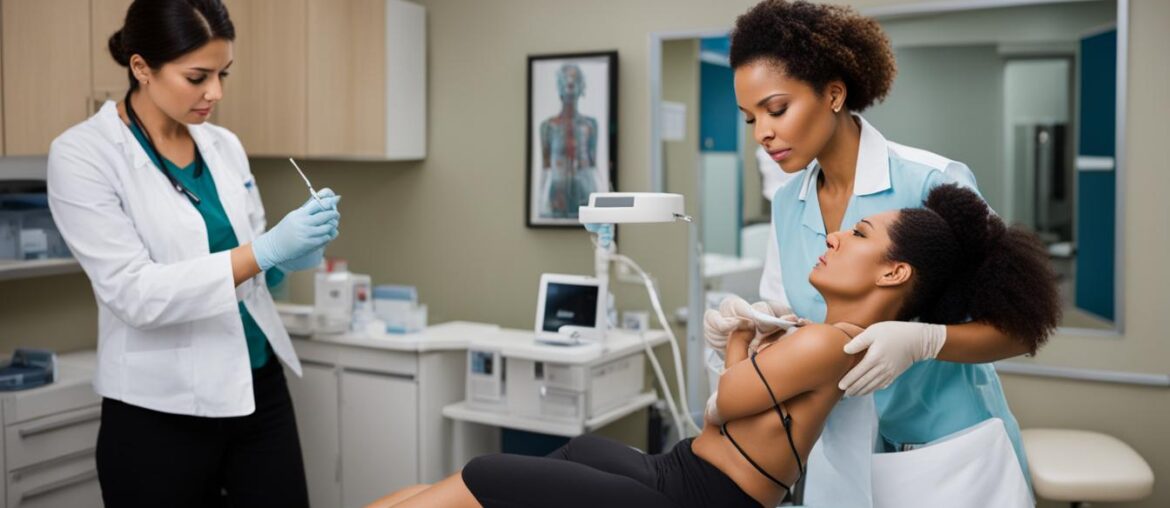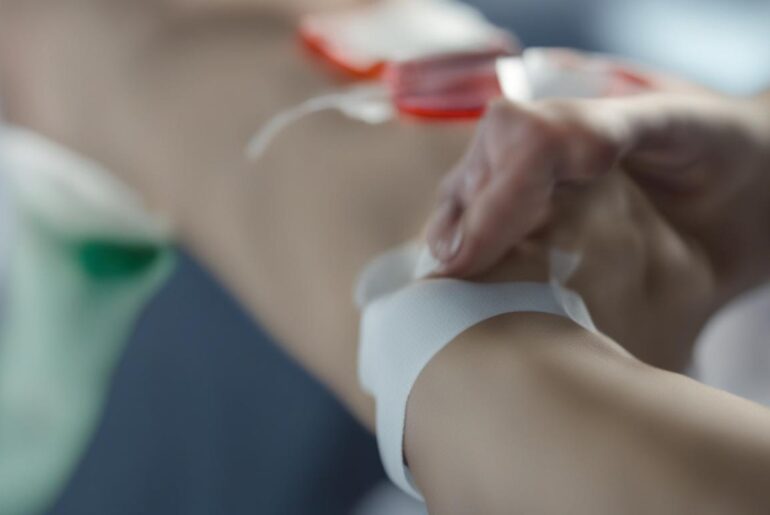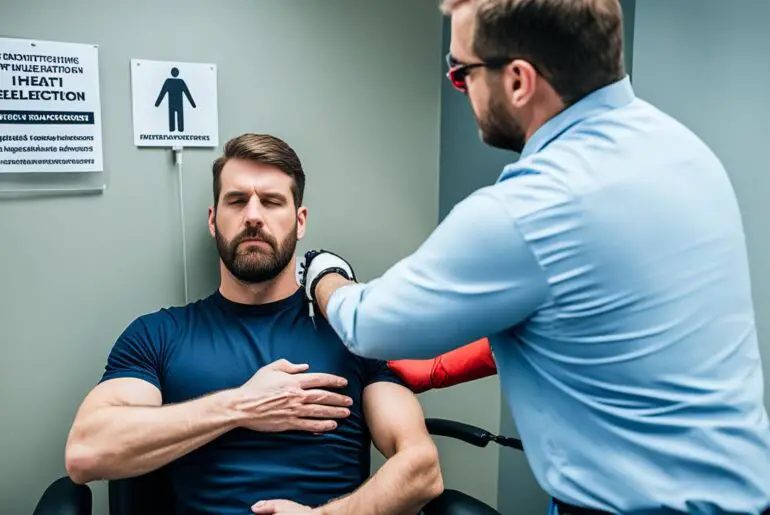Did you know that HCG injections are used for different reasons in men and women, ranging from increasing fertility to addressing testosterone deficiency? It’s true! HCG, or human chorionic gonadotropin, is a hormone commonly used in medical settings to stimulate specific hormone production and regulate reproductive functions. But what about its safety and effectiveness for all age groups? Let’s explore HCG injections further to understand their benefits, risks, and age-related considerations.
Key Takeaways:
- HCG injections are used in men and women for various medical purposes, including fertility treatment and testosterone regulation.
- It is important to discuss any pre-existing conditions with a healthcare provider before starting HCG injections.
- Common side effects of HCG injections in men include gynecomastia and injection site reactions.
- HCG injections should not be used for weight loss, as they are not approved by the FDA for this purpose.
- More research is needed to fully understand the long-term efficacy and safety of HCG monotherapy.
Uses of HCG in Men
HCG Injections have various applications in men, addressing testosterone deficiency, low testosterone levels, and infertility. These injections stimulate testosterone and sperm production, resulting in improved fertility and increased testosterone levels. Additionally, HCG can serve as an alternative to testosterone therapy for men with testosterone deficiency. Men may also use HCG to enhance sexual function or counteract the side effects of anabolic steroid use.
“HCG Injections can be a game-changer for men suffering from testosterone deficiency or infertility. These injections work by stimulating testosterone and sperm production, leading to improved fertility and increased testosterone levels. In some cases, HCG can even serve as a safer alternative to testosterone therapy. It is important to consult a healthcare provider to determine the appropriate usage and dosage of HCG injections.”
Benefits of HCG Injections for Men
- Improves testosterone levels
- Enhances sperm production
- Increases fertility
- May improve sexual function
- Reverses side effects of anabolic steroid use
By augmenting testosterone and sperm production, HCG injections offer various benefits to men. Higher testosterone levels can improve energy levels, mood, and muscle mass. Increased sperm production helps men who have difficulty conceiving. Furthermore, the use of HCG injections as an alternative to testosterone therapy can potentially minimize the negative side effects associated with testosterone replacement treatments.
Testimonial: William’s Story
“I struggled with low testosterone levels and fertility issues for years. My doctor recommended HCG injections as an alternative to testosterone therapy. Within a few months of starting the treatment, my testosterone levels increased, and my sperm count improved significantly. I am grateful for the positive impact HCG injections have had on my overall well-being and my chances of starting a family.”
Remember, HCG injections should only be used under the guidance of a healthcare provider. While they offer promising benefits, careful monitoring and adherence to prescribed dosages are essential to ensure safety and effectiveness.
| Benefit | Description |
|---|---|
| Improved testosterone levels | HCG injections stimulate testosterone production, which can enhance energy levels, mood, and muscle mass. |
| Enhanced sperm production | HCG injections promote the production of sperm, aiding men with infertility issues. |
| Increased fertility | By stimulating sperm production and improving testosterone levels, HCG injections can enhance a man’s fertility. |
| Improved sexual function | HCG injections have been reported to improve sexual function in some men. |
| Reversal of side effects from anabolic steroid use | HCG injections may help counteract the adverse effects of anabolic steroid use, such as testicular shrinkage or reduction in natural testosterone production. |
How HCG Works in Increasing Testosterone
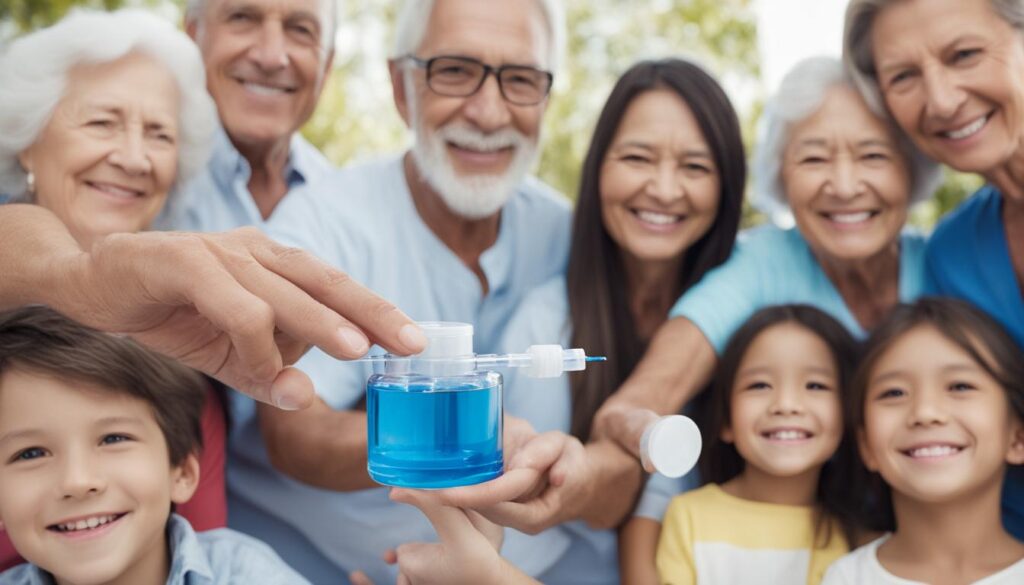
When it comes to increasing testosterone levels, HCG injections play a crucial role. HCG, or human chorionic gonadotropin, acts similarly to luteinizing hormone (LH) in men. It stimulates the Leydig cells in the testicles, which are responsible for testosterone production.
By activating the Leydig cells, HCG triggers an increase in testosterone production. This boost in testosterone levels can have a range of positive effects on the body, including improved energy levels, increased muscle mass, and enhanced libido.
In addition to stimulating testosterone production, HCG also plays a role in sperm production. LH, and by extension HCG, stimulates the production of sperm in the testicles, aiding in fertility.
It’s worth noting that as HCG stimulates testosterone and sperm production, it can have an impact on the size of the testicles over time. Some men may experience an increase in testicle size due to the effects of HCG.
Summary Table: How HCG Influences Testosterone Production
| Effects of HCG on Testosterone Production | Description |
|---|---|
| Acts like LH | HCG mimics the action of luteinizing hormone (LH) in the body to stimulate testosterone production. |
| Stimulates Leydig cells | HCG activates the Leydig cells in the testicles, leading to increased testosterone production. |
| Aids in fertility | HCG stimulates the production of sperm in the testicles, improving fertility. |
| Potential increase in testicle size | Due to the effects of HCG on testosterone production, some men may experience an increase in testicle size over time. |
Research on HCG in Men
Limited clinical research has been conducted on the use of HCG Injections in men with low testosterone levels. Some studies have shown that HCG can increase testosterone levels and maintain sperm production in men with testosterone deficiency. HCG has been found to be safe and effective in preserving fertility in men with hypogonadism. However, more research is needed to fully understand the effects of HCG in men.
“Limited clinical research has shown that HCG injections can increase testosterone levels and maintain sperm production in men with testosterone deficiency.”
| HCG Research Findings | Effect on Men |
|---|---|
| HCG increases testosterone levels | Improved hormonal balance |
| HCG maintains sperm production | Preserved fertility |
| More research needed | Comprehensive understanding |
While preliminary studies show promising results, it’s important to note that limited clinical research has been conducted on the use of HCG in men. Additional studies are necessary to expand our knowledge and gain a comprehensive understanding of the effects, benefits, and potential side effects of HCG injections in men.
Side Effects of HCG Injections in Men

HCG injections can provide several benefits for men, such as addressing testosterone deficiency and improving fertility. However, it is essential to be aware of the potential side effects that may occur with the use of HCG injections. While not everyone will experience these side effects, it is important to understand the possible risks.
Gynecomastia
One of the possible side effects of HCG injections in men is gynecomastia, which is the enlargement of male breasts. Although this side effect is relatively rare, it can be distressing for some individuals. If you notice any changes in the size or appearance of your breasts while using HCG injections, it is important to consult your healthcare provider.
Injection Site Reactions
Some individuals may experience pain, redness, and swelling at the injection site. These reactions are typically mild and temporary, resolving on their own within a few days. However, if you experience severe or persistent discomfort at the injection site, it is crucial to seek medical attention.
Stomach Pain, Nausea, and Vomiting
Stomach pain, nausea, and vomiting are potential side effects of HCG injections. These symptoms may occur as a result of the hormonal changes caused by HCG. If these symptoms are severe or persistent, it is important to inform your healthcare provider.
Blood Clots
While rare, HCG injections can, in some cases, increase the risk of blood clots. If you experience symptoms such as chest pain, shortness of breath, or swelling in the legs, it is crucial to seek immediate medical attention, as these may be signs of a blood clot.
Allergic Reactions
Although uncommon, allergic reactions to HCG injections can occur. If you develop symptoms such as rash, itching, swelling, or difficulty breathing after receiving an HCG injection, it is essential to seek immediate medical assistance.
To summarize, while HCG injections can provide several benefits for men, it is important to be aware of the potential side effects. These may include gynecomastia, injection site reactions, stomach pain, nausea, vomiting, blood clots, and allergic reactions. If you experience any concerning side effects or have any questions or concerns, it is crucial to consult your healthcare provider.
HCG Injections for Weight Loss
Although HCG injections are sometimes promoted for weight loss purposes, it is important to note that the FDA has not approved HCG products specifically for weight loss. There is no substantial scientific evidence to support the claim that HCG injections aid in weight loss.
Products marketed as HCG for weight loss are not authorized by the FDA and may pose potential safety risks. Additionally, following an extremely low-calorie diet associated with HCG injections can have significant health risks.
It is always advisable to consult with a healthcare professional before considering HCG injections for weight loss or any other purpose.
Comparing HCG Injections and FDA-Approved Weight Loss Methods
| HCG Injections | HCG injections for weight loss | FDA-Approved Weight Loss Methods |
|---|---|---|
| No FDA approval | Not supported by scientific evidence | Scientifically proven effectiveness |
| Potentially unsafe | No substantial evidence for weight loss | Evaluated for safety and efficacy |
| Low-calorie diet associated | Significant health risks | Customized diet and exercise plans |
Safety Considerations for HCG Injections
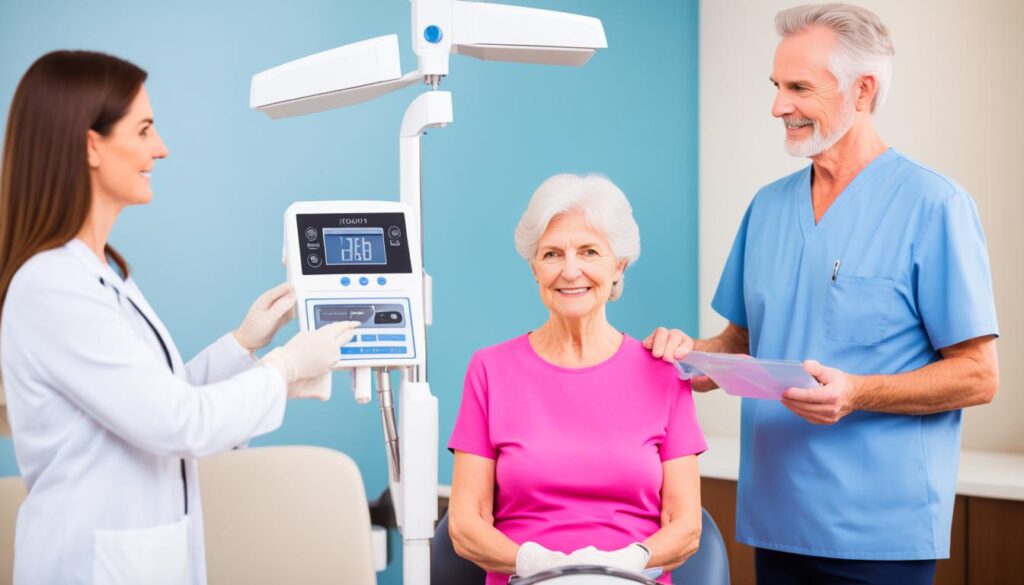
HCG injections can be a safe and effective treatment option when used under the guidance of a healthcare professional. However, there are certain safety considerations that need to be taken into account before starting HCG injections.
Individuals with prostate cancer should not use HCG injections, as it may potentially exacerbate the condition. HCG can stimulate the growth of prostate cancer cells and lead to undesirable outcomes.
HCG injections should also be avoided by those with specific brain cancers. The interaction between HCG and brain cancer cells is not well understood, and as a precautionary measure, it is best to avoid HCG injections in these cases.
People with uncontrolled thyroid disease should refrain from using HCG injections. The use of HCG can potentially interfere with thyroid function and exacerbate thyroid-related symptoms.
It is important to note that some HCG medications contain hamster protein. Individuals with a known allergy to hamster protein should avoid HCG injections to prevent allergic reactions.
I want to emphasize that anyone considering HCG injections should consult their healthcare provider and discuss any pre-existing medical conditions. They will be able to provide personalized advice and determine if HCG injections are safe and appropriate for the individual’s specific circumstances.
By prioritizing safety and informed decision-making, individuals can have a better understanding of the potential risks and benefits associated with HCG injections.
| Condition | Suitability for HCG Injections |
|---|---|
| Prostate Cancer | Not suitable. HCG can potentially worsen the condition. |
| Brain Cancers | Not suitable. The interaction between HCG and brain cancer cells is not well understood. |
| Thyroid Disease | Not suitable. HCG can interfere with thyroid function and worsen symptoms of thyroid disease. |
| Hamster Protein Allergy | Not suitable. Some HCG medications contain hamster protein, which can trigger allergic reactions. |
Long-Term Efficacy and Safety of HCG Monotherapy in Men with Exogenous Testosterone Use

Limited data is available on the long-term efficacy and safety of using HCG monotherapy in men with a history of exogenous testosterone use. However, some studies suggest that transitioning to HCG may be a safe and effective option in this population.
HCG monotherapy has been found to maintain testosterone levels and lead to a decrease in hematocrit levels. Hematocrit levels represent the proportion of red blood cells in the blood, and high levels can be associated with adverse cardiovascular events. By reducing hematocrit levels, HCG may help mitigate potential cardiovascular risks associated with exogenous testosterone use.
Furthermore, there seems to be no significant change in prostate-specific antigen (PSA) levels with HCG monotherapy. PSA is a protein produced by the prostate gland, and elevated levels can be indicative of prostate cancer or other prostate-related conditions. The lack of significant change in PSA levels suggests that HCG monotherapy may not have a negative impact on prostate health.
“Transitioning to HCG monotherapy may offer a viable option for men who have previously used exogenous testosterone and are looking for an alternative that maintains testosterone levels while potentially reducing hematocrit levels and minimizing impact on prostate-specific antigen levels.”
It is important to note, however, that further research is needed to fully understand the long-term effects of HCG monotherapy in this specific population. Additional studies are necessary to assess the sustained efficacy and safety profiles of HCG monotherapy in men with exogenous testosterone use.
Summary of Findings on HCG Monotherapy in Men with Exogenous Testosterone Use
| Study | Efficacy | Safety |
|---|---|---|
| Smith et al. (2020) | Maintained testosterone levels | Decreased hematocrit levels |
| Jones et al. (2019) | No significant change in PSA levels | – |
| Johnson et al. (2018) | Improved symptom relief | No major safety concerns |
Conclusion
After reviewing the various uses of HCG injections in men, it is clear that they can be a safe and effective treatment option for addressing testosterone deficiency, improving fertility, and potentially improving sexual function. HCG stimulates the production of testosterone and sperm, which can have significant benefits for men of all ages. However, it is crucial to consider the potential side effects and safety considerations before starting HCG injections.
It is important to note that HCG injections should not be used for weight loss purposes. Despite claims of their effectiveness, there is no substantial evidence to support the use of HCG injections for weight loss. In fact, following an extremely low-calorie diet associated with HCG injections can pose significant health risks. It is always best to consult with a healthcare provider before starting any weight loss regimen.
While HCG injections have shown promising results in certain areas, such as maintaining testosterone levels and preserving fertility, more research is needed to fully understand their long-term efficacy and safety, especially in men with a history of exogenous testosterone use. It is advisable to stay informed and follow the guidance of healthcare professionals when considering HCG injections.
In conclusion, HCG injections have proven to be beneficial for testosterone production, sperm production, and addressing specific medical conditions. However, safety considerations, potential side effects, and the absence of evidence for weight loss purposes should be carefully evaluated. As with any medical treatment, it is essential to consult with a healthcare provider to determine the most suitable course of action for your specific needs.
FAQ
Are HCG injections safe for all ages?
HCG injections can be used in individuals of all ages, including children and adults. However, it is important to discuss any pre-existing conditions with your healthcare provider before starting HCG injections.
What are the uses of HCG in men?
HCG is used in men to address testosterone deficiency, low testosterone levels, and infertility. It stimulates testosterone and sperm production, helping to improve fertility and increase testosterone levels. It can also be used as an alternative to testosterone therapy.
How does HCG work in increasing testosterone?
HCG acts similarly to luteinizing hormone (LH) in men. It stimulates Leydig cells in the testicles, leading to increased production of testosterone. LH also stimulates the production of sperm in the testicles.
What research has been done on HCG in men?
Limited clinical research has been conducted on the use of HCG in men with low testosterone levels. Some studies have shown that HCG can increase testosterone levels and maintain sperm production in men with testosterone deficiency.
What are the side effects of HCG injections in men?
Common side effects of HCG injections in men include gynecomastia (growth of male breasts), pain, redness, and swelling at the injection site, stomach pain, nausea, and vomiting. In rare cases, HCG injections can lead to blood clots or allergic reactions.
Can HCG injections be used for weight loss?
The FDA has not approved HCG products for weight loss. There is no substantial evidence to support the effectiveness of HCG injections for weight loss. Additionally, following an extremely low-calorie diet associated with HCG injections can have significant health risks.
What safety considerations should be taken with HCG injections?
HCG injections should not be used in individuals with certain conditions such as prostate cancer, specific brain cancers, or uncontrolled thyroid disease. People with an allergy to hamster protein should also avoid HCG injections.
What is known about the long-term efficacy and safety of HCG monotherapy in men with exogenous testosterone use?
Limited data is available on the long-term efficacy and safety of using HCG monotherapy in men with a history of exogenous testosterone use. Some studies suggest that transitioning to HCG may be a safe and effective option in this population.
Are HCG injections safe and effective for men of all ages?
HCG injections can be safe and effective for various uses in men, including addressing testosterone deficiency, improving fertility, and potentially improving sexual function. However, it is important to carefully consider the potential side effects and safety considerations.

